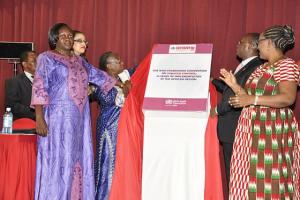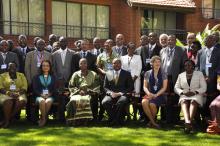Tobacco control must accelerate to protect innocent children, women and men in Africa
Nairobi, February 27 2015 -- Delegates attending the WHO Framework Convention on Tobacco Control (FCTC) in Nairobi marked the 10-year celebration of the implementation of tobacco control in Africa with jubilation and concerted determination to fight the tobacco epidemic to the end.
The delegates from 39 of the 47 countries in the World Health Organization (WHO) African Region agreed to the Nairobi Declaration on FCTC to accelerate comprehensive measures, which will save the lives of innocent children, youth and adults from tobacco-related diseases.
The declaration requests Member States to strengthen and enforce comprehensive tobacco control policies, legislation and regulations that fully incorporate the obligations of the WHO Framework Convention on Tobacco Control and its guidelines.
The decade celebration was also marked by the launch of a publication: The WHO Framework Convention on Tobacco Control: 10 years of implementation in the African Region.
The publication outlines the status of implementation of each Member State, what they have achieved and what still needs to be done. Three countries, Malawi, Eritrea and South Sudan have yet to ratify the convention and Mozambique is a signatory.
The launch was presided over by Kenya’s Health Cabinet Secretary James Macharia on behalf of Kenya’s Deputy President William Ruto. Speaking at the launch, Mr Macharia said the historic commemoration of the 10th anniversary of FCTC was an affirmation of commitment for a healthier population and an indication of the strength of the global community to confront a common enemy.
He acknowledged that member countries had worked hard to keep the momentum but they had also been confronted by gross interference from the tobacco industry and challenges to implement the law and enforce regulations and numerous conflicts of interests.
“The gains we have made to control tobacco use are however evident and worth our efforts,” he said. In Kenya, a decline in tobacco use had been noted both among the adults and youth due to the efforts and mechanisms put in place to control tobacco use.
The Kenya Demographic Survey had shown that tobacco consumption had declined from 23% in 2003 to 19% in 2008, while the Global Adult Tobacco Survey (GATS) had shown a decline from 15.1% in 2007 to 9.9% in 2013. This was evidence that sustained surveillance and control measures lead to a decline in tobacco consumption, he added.
He urged governments in the Region to consider ratifying the Protocol to Eliminate Illicit Trade in Tobacco Products to help stop the growing international illicit trade of tobacco products. The illicit trade posed a serious threat to public health, increased the accessibility and affordability of tobacco products, and fuelled the tobacco epidemic and undermined tobacco control policies.
“It also causes substantial losses in government revenues and the establishment of a tracking and tracing regime will go a long way to secure the supply chain of tobacco products to curb illicit trade, while protecting government revenues”.
Mr Macharia speaking on his own behalf said the sole motivation to fight against tobacco use should be about saving lives of innocent children and adult smokers.
“Our motivation must be the fact that we have conviction that we are doing the right thing and not because it is a job description.”
He called on members to share insights and experiences with each other to help overcome the challenges they face in fighting the epidemic and implementing proposed measures.
Speaking on behalf of Dr Matshidiso Moeti, WHO Regional Director for Africa, the WHO Kenya County Representative Dr Custodia Mandlhate told delegates that the WHO FCTC was an evidence-based health treaty with a comprehensive framework that tackled the tobacco epidemic in various ways.
She commended countries for the measures that they had taken over the past 10 years including banning smoking in public places and prohibiting advertising, promotion and sponsorship of tobacco and tobacco-related products.
She said evidence had shown that a comprehensive ban had a better and faster effect on decreasing initiation and use of tobacco by the general population. She called on member countries to be prepared for the tobacco industry that is well-resourced and doing everything they could to stop progress in implementing the WHO FCTC.
“The next 10 years are going to be critical if we are to achieve the objectives of the WHO FCTC. We need to secure our gains and use them as a strong base for further success,” said Dr Mandlhate.
She called on members to “to expand the circle of tobacco control advocates and involve more sectors including trade and commerce, public finance, customs, agriculture, foreign affairs among others.”
Civil society and relevant private sector players were also key and should be engaged to sustain tobacco control. The Nairobi Declaration calls for Member States to institutionalize comprehensive multisectoral actions, sustainable funding mechanisms, and ratify the Protocol to Eliminate Illicit Trade in Tobacco Products.
The delegates also outlined the need for regional and global cooperation and collaboration to enable them to sustain effective implementation of the WHO FCTC. The declaration further calls on other UN agencies and development partners to mobilize and provide financial and technical support to enable members to fulfil their priorities.









